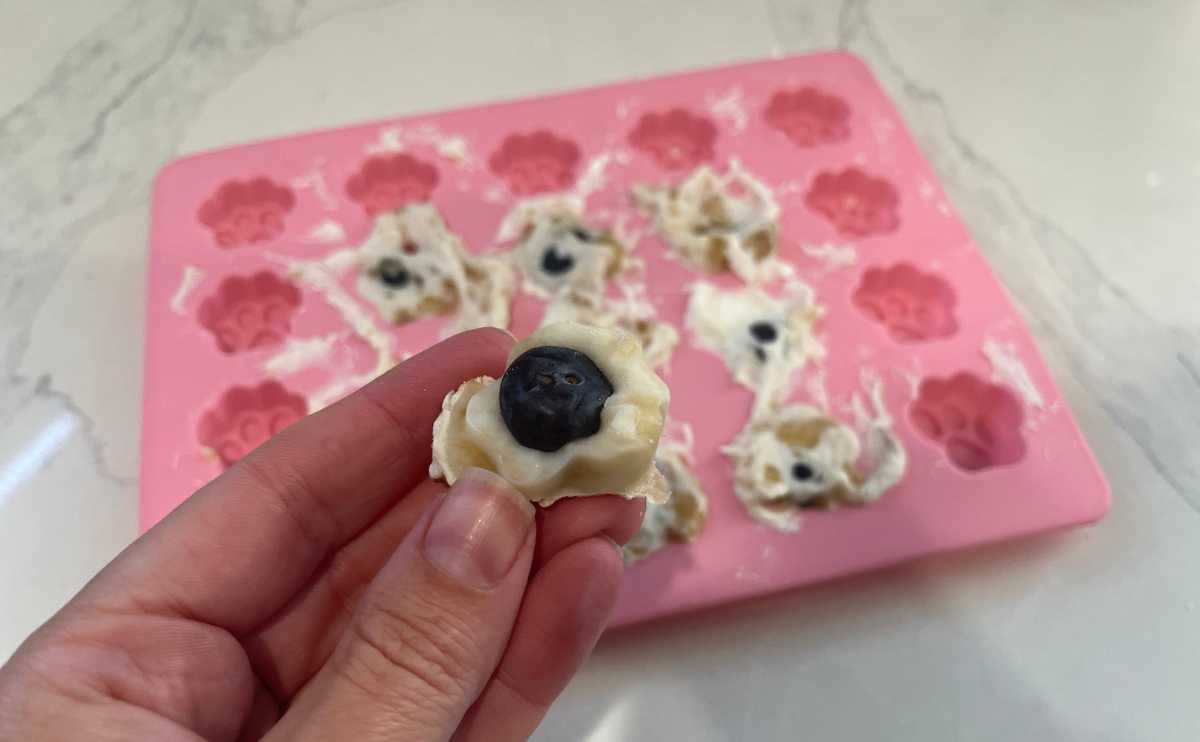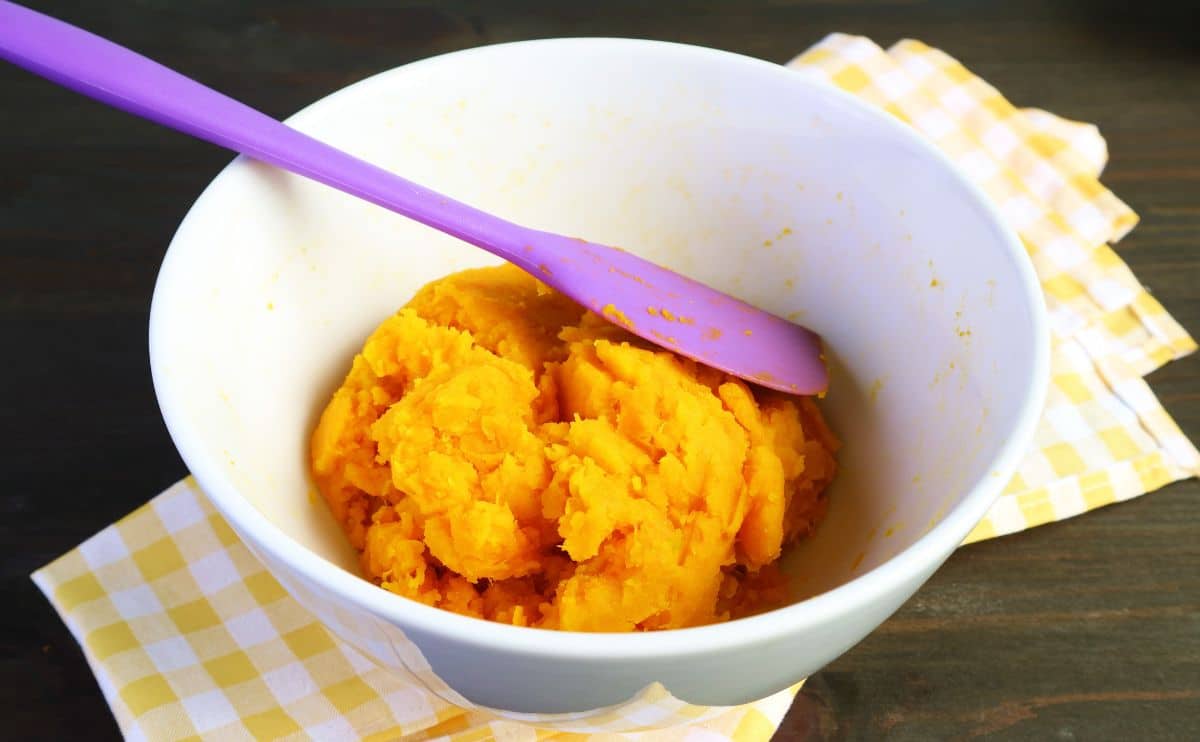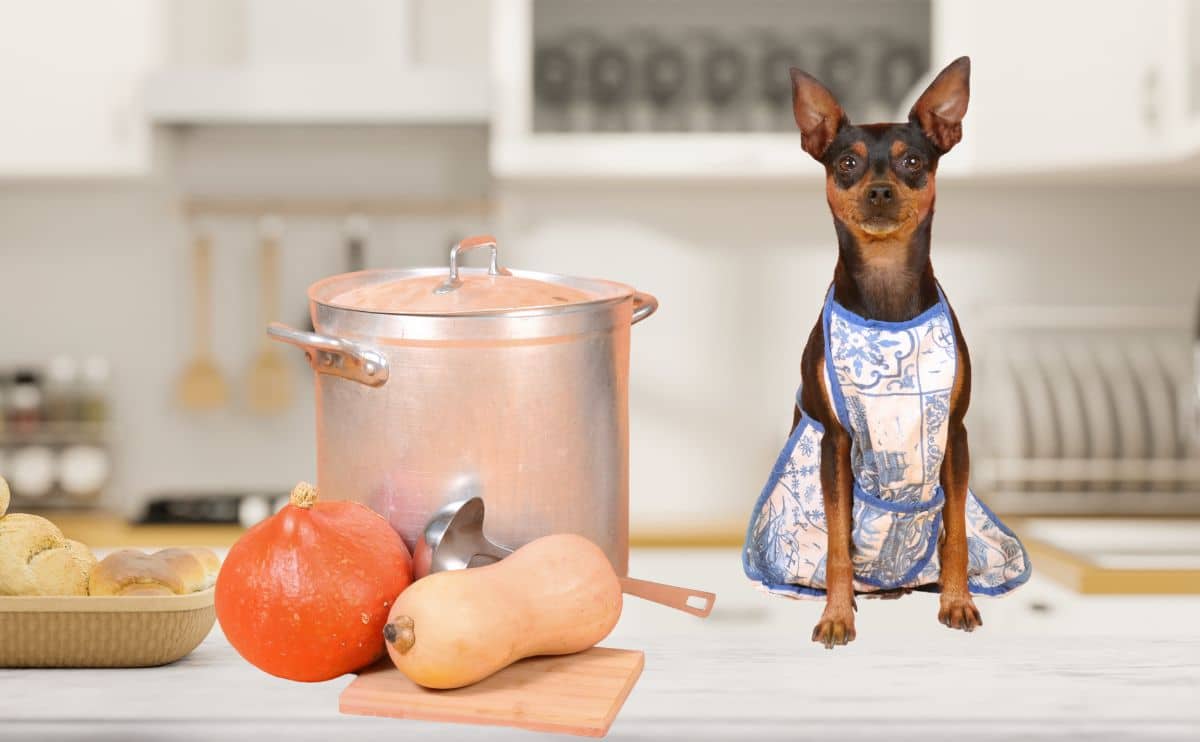What Fruit Can Dogs Eat? 23 Pup-Safe Fruits
When you purchase through links on our site, we may earn a commission. Here’s how it works.
Have you ever wondered if your dog can eat fruit? Do dogs like fruit? Is fruit good for dogs? There are plenty of questions about this topic. Fruit isn’t a necessary part of your dog’s daily diet, but many add health benefits. Dogs love the textures and flavors of fruit, and it’s very common to find them in premium pet foods. As with many human foods, some fruit can be harmful to our four-legged friends, so it’s important to know what’s safe and what isn’t. Our comprehensive guide shares the best fruits for your pup, potential health benefits, safe serving guidelines, and more.
Table of Contents
Healthy Ways To Add Fruit To Your Dog’s Diet
Many fruits make yummy snacks straight from your fridge or pantry (as long as you wash them first), or you can easily use them in homemade dog treats. They also make great food toppers to entice picky eaters. Although many fruits are low in calories, you still need to make sure you share them with your furry friend in moderation. And always check with your veterinarian before you give your pup any new food.
Experts agree that it’s extremely important to moderate treats, snacks, or any additional food you give your dog. “I regularly come across dogs who are overweight, and often the underlying reason is that they eat too many treats in addition to their dog food,” says Hannah Godfrey, BVetMed, MRCVS, a small animal veterinarian at Bridges Veterinary Surgery in Cardiff, Wales.
“It’s easy to get carried away when giving your dog treats, especially if you’re training them, but to avoid becoming overweight or unhealthy, treats should be no more than 10% of a dog’s daily food intake.”
Godfrey shares one example of how easy it is for owners to fall into the treat trap. “I saw a young rescue dog recently who was a bit anxious. The owner was giving lots of treats to try to train them and combat boredom and separation anxiety. As a result, they were piling on the pounds! Thankfully, by giving fewer treats, swapping treats for healthier raw carrots, and providing other types of rewards and enrichment, the dog lost weight.”
23 Fruits That Are Safe For Your Dog
Many of the fruits that we humans like the best are also the healthiest picks for our furry friends. Just be sure not to overdo it, and don’t let fruit replace your pup’s regular meals.
1. Apples

Dogs can safely eat apples. Apples are crunchy and tasty and provide Vitamin A and C. Apples also provide dietary fiber, calcium, antioxidants, and phosphorus. Removing cores and seeds that can contain cyanide, a substance toxic to canines, is essential. Apples should be fresh, raw, and not overripe. Dogs can eat apple slices or puree.
If you have an apple tree in your yard, it’s important to clean up old, fermented apples. These can contain higher levels of ethanol, which can make your dog sick.
Stick to two or three apple slices at treat time. Too much apple at one time can cause a tummy ache or diarrhea. And a whole apple contains too much fructose (a “fruit sugar”) for our pups. Dogs love raw apples, but you can also add plain, pureed apples to homemade baked treats.
If you want to give your pup a real treat, add a little natural peanut butter to the slices; you may just have found her new favorite snack. Green apples contain slightly less sugar and carbs and a bit more vitamin A than red apples, so they may be a better pick if your pup likes the taste.
Benefits:
- Freshens dog breath and cleans teeth
- Good source of Vitamins A and C, fiber, calcium, and phosphorus
- Phytochemicals in apple skin help fight cancer.
- Low-calorie treat
- Apples reduce inflammation and aid in digestion
- Good source of hydration
Our Personal Experience Feeding Dogs Apples
My black Lab Bear loved apples. If I let him, he would happily eat an entire apple. A few bits mixed in with his kibble were always a good way to get him to eat and helped keep his digestion regular.
– Danielle DeGroot, Rescue Dog Owner, Canine Journal Research & Writing
2. Apricots
Apricots are okay for dogs as long as the pits have been removed. The pits are a choking hazard and contain cyanide, which is quite dangerous. Apricots are rich in antioxidants like beta-carotene, which can help improve eyesight. It also has benefits in regulating cholesterol and contains fiber and potassium. The dietary fiber in apricots helps with relieving constipation and maintaining bowel health. Vitamins A and C support the immune system, skin, and bone health. Apricots are also very helpful in combating the effects of aging on a canine’s body.
Remove all leaves, pits, and stems and cut them into bite-sized pieces before serving to your pup. Dried fruit is okay if it does not contain added sugar or artificial sweeteners.
Benefits:
- Relieves constipation
- Maintain bowel movements
- Antioxidants boost the immune system and skin health
- Potassium can help lower cholesterol
3. Bananas

Bananas are safe as an occasional treat, and dogs enjoy the texture. However, they contain a lot of sugar, so they should not be fed in large quantities or very often. As bananas ripen, the sugar and carb content rises, so avoid those overripe ones. Unripe, green bananas don’t taste as good, and your pup may not like them.
Bananas contain potassium, fiber, biotin, and Vitamin B6. Dogs should not be fed the banana peel, which is hard to digest and may pose a choking hazard. They are best served raw, peeled, and sliced. Bananas are not a healthy choice for diabetic dogs or overweight dogs.
Benefits:
- High in biotin, potassium, Vitamin C, B6, magnesium, fiber, and manganese
- Low sodium and cholesterol
- Helpful to settle an upset stomach
- Provide a boost of energy
- Help maintain healthy blood pressure
- Support brain, bone, muscle, skin, coat, and immune health
Our Personal Experience Feeding Dogs Bananas
“Sometimes my kiddos don’t finish their bananas, so I cut them up and put them in my dog’s food dish for her as a little snack. She gobbles it up. Funny enough, if I try to give her half of a banana that’s not cut up, she refuses to eat it. She’s very particular about how she wants her bananas.”
– Kimberly Alt, Treeing Walker Coonhound Parent, Canine Journal Writer & Pet Insurance Expert
4. Bell Peppers
Bell peppers are flavorful and nutritious. They contain plenty of vitamins like A, C, and E and are also a great source of antioxidants. Bell peppers have a good amount of flavor, and many dogs enjoy the crisp crunch. Red bell peppers contain the most vitamins and nutrients, but all colors are safe and healthy.
Smaller dogs can eat about one-fourth of a bell pepper, and larger dogs can eat about a half, but this should not be an everyday treat. You can chop the peppers up and mix them in your pup’s bowl or give them as a crunchy treat on a hot day. Stay away from jalapeños, though. Those spicy peppers are not safe for dogs to eat.
Benefits
- Antioxidants
- Vitamins A, B6, C, E, and K
- Potassium and folate
- Supports eye health
5. Blackberries
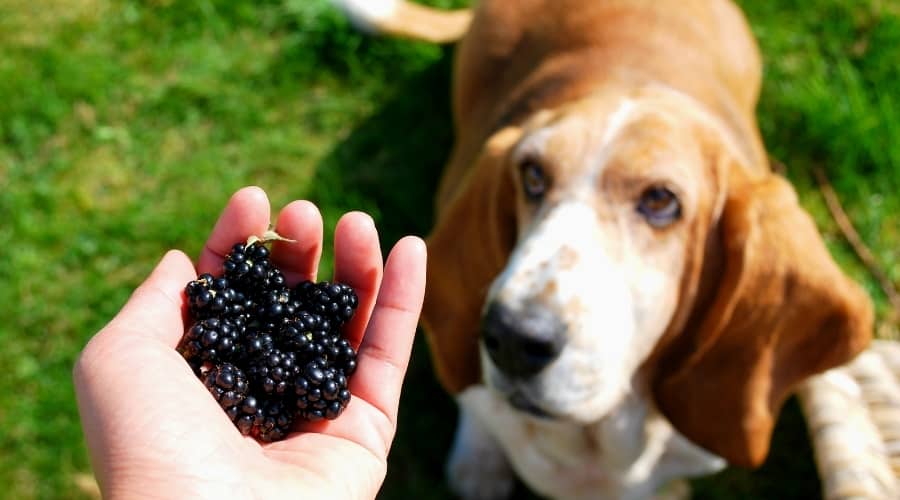
Blackberries are suitable for canines to eat in appropriate servings. These berries provide antioxidants, fiber, Vitamins A, C, K, and E, Omega-3’s, tannin, manganese, and folate. The omega-3 fatty acid in blackberries helps keep their coat glossy and also helps reduce inflammation. Antioxidants are beneficial to improve brain function and work as an anti-inflammatory.
Depending on your pup’s size, two or three fresh berries are a perfect serving.
Benefits:
- Promotes brain, heart, and coat health
- Supports muscle development
- Reduces inflammation
- Fiber aids in digestion
- Low in calories
6. Blueberries

Fresh blueberries are loaded with antioxidants, anti-inflammatory, and vitamins. They are also very low in calories. Dogs enjoy the taste and texture, and these can be a healthy snack, though it is crucial when feeding smaller breeds to be aware these can be a choking hazard.
Dogs should only eat fresh or frozen berries. Owners should mash them up for smaller pups and let them thaw slightly to reduce the chance of choking.
Benefits
- Low in calories and sugar
- Vitamin C and K, calcium, iron, magnesium, and zinc
- Supports brain health
- Supports heart function
- Rich in antioxidants and phytochemicals, which help prevent cell damage, have anti-cancer properties and fight heart disease
Our Personal Experience Feeding Dogs Blueberries
Our Cavaliers LOVE blueberries as treats. You can freeze them, too so they aren’t as messy to eat (and they last longer). It’s a nice, sweet treat in the summertime. I also like to mix them up with yogurt or peanut butter in a frozen mold to make yummy dog treats too”
– Sadie Cornelius, Cavalier King Charles Spaniel Parent, Canine Journal Creative & Marketing
7. Butternut Squash
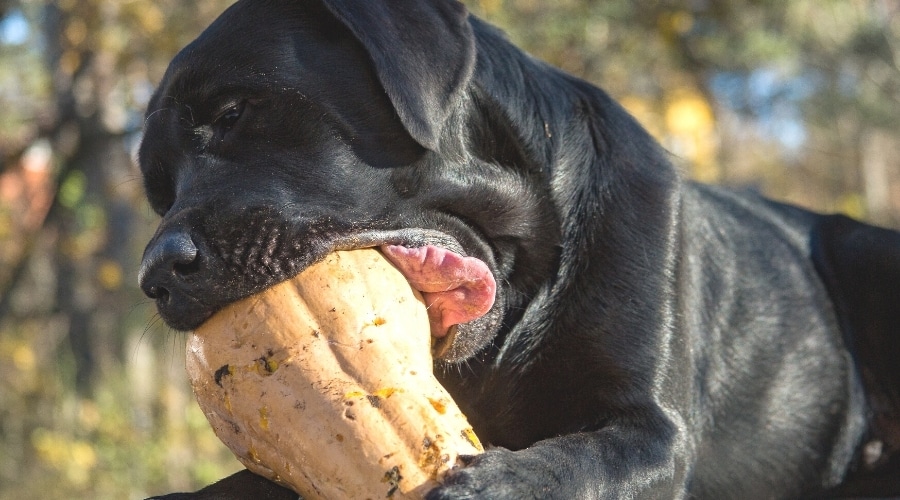
Though we don’t often think of it as fruity, butternut squash is technically a fruit. This winter squash grows on a vine and is a popular food for humans. It is also high in Vitamins A and C. Feeding a dog butternut squash has a beneficial effect on growth, development of strong muscles, and eye health, and it helps prevent skin problems and hair loss.
Butternut squash can be fed raw, but it’s better enjoyed cooked. Owners can bake, dehydrate, or cook it, mash it up, and then add it to their dog’s food. Avoid feeding your pup the skin. It is tough to chew and digest and may be a choking hazard.
Benefits:
- Boosts immune system health
- Loaded with fiber, which aids in digestion and makes tummies feel full
- Low in carbohydrates and calories
- It can help with diarrhea
- Beneficial for eye and muscle health
8. Cantaloupe
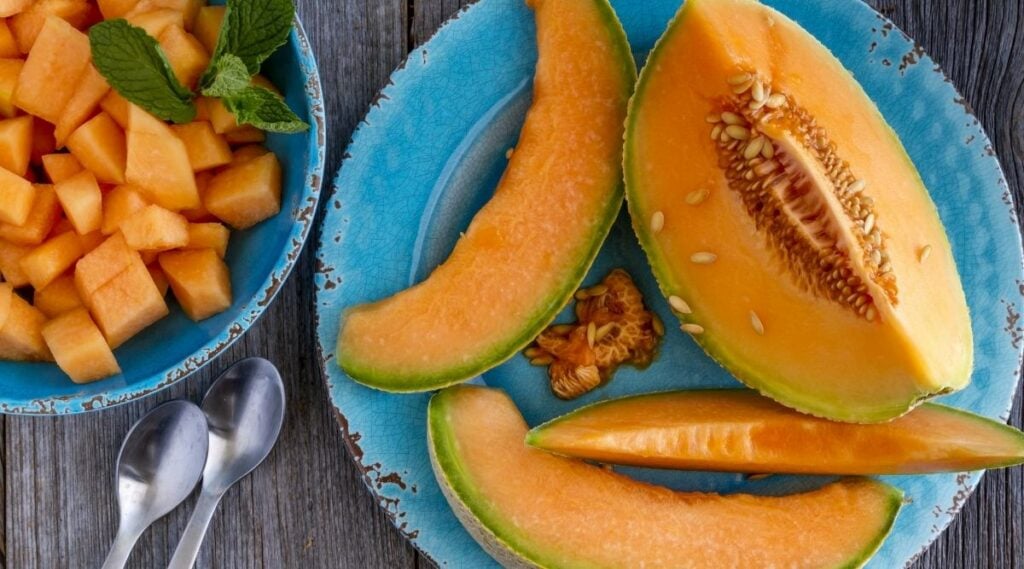
Cantaloupe is a terrific source of dietary fiber, though it has higher sugar. As with other fruits like honeydew, cantaloupe should only be fed in moderation. It is also loaded with water, making it a great way to add hydration to your pup’s diet.
This succulent melon is loaded with nutrients, a fantastic source of water and fiber, and is low in calories. However, the high sugar content makes moderate feeding important. It’s not a great choice for dogs with diabetes or those packing extra pounds. Although the seeds and rind aren’t toxic, they could pose a choking hazard, so it’s best to remove them.
Benefits:
- 90% water, fantastic for keeping your dog hydrated
- Fiber-rich to support digestive health
- High in vitamins A and C for cell and immune health
- Good source of vitamins B6, C, and K, potassium, calcium, niacin, folate, and more nutrients
- Supports heart health
- Anti-inflammatory effects
9. Coconut
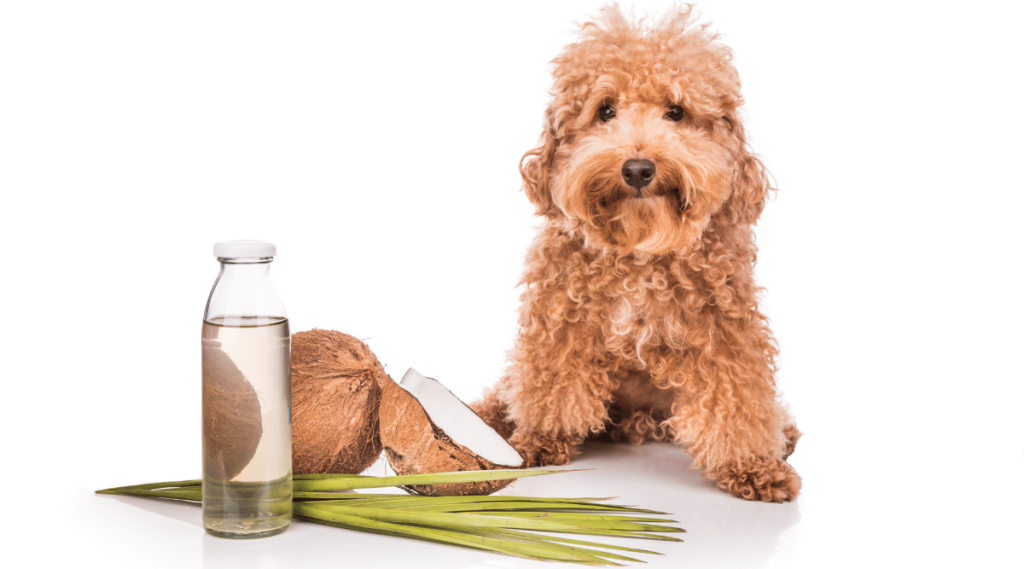
Though not as common as some other fruits on this list, coconut has several health benefits.
Coconut meat is not toxic to dogs and is a bit healthier for our pups than coconut oil because it’s slightly lower in fat. However, both have higher fat content, so they should be fed in small amounts. And too much coconut can cause tummy troubles and bloating. Both the meat and oil contain antioxidants and other nutrients that help boost the immune system, reduce inflammation, and are good for healthy skin.
Coconut can be served cut into bite-sized pieces, raw, or cooked into dog treats. It should only be fed in small amounts, as it contains triglycerides that may cause large amounts of bloating and stomach pain. This also helps reduce inflammation. High levels of antioxidants boost skin, eye, and immune system health.
Always remove the shell and cut the meat into small pieces.
Benefits:
- It can fight off fungi and bacteria
- Aids with digestion
- Helps with stinky breath
- It keeps the coat shiny and the skin healthy
- Immune system support
- Reduces inflammation
10. Cranberry
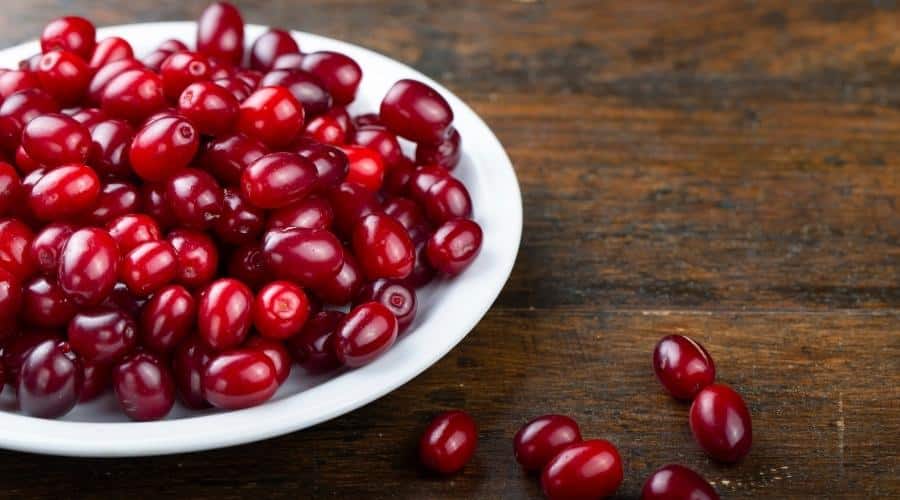
Cranberries are known to help with urinary tract health and are suitable for dogs to eat. These tiny, tart berries are high in fiber and antioxidants and a good source of Vitamins A, E, K, B1, B2, and copper.
Cranberries are best known for their ability to combat urinary tract infections (UTIs) in humans, but studies in dogs aren’t conclusive. A few cranberries are safe for dogs, but too many can cause stomach upset and lead to bladder stones. Fortunately, given this berry’s tartness, many dogs aren’t big fans. And there are plenty of other fruits that are healthier for our canine companions.
Dried and fresh fruits are okay as long as they have no added sugar or artificial sweeteners like xylitol.
Benefits:
- Supports bladder and urinary tract health
- Antioxidant-rich
- Helps protect teeth
- Overall health boost
11. Cucumber
Although many think of cucumbers as a vegetable, they’re technically a fruit. While cucumbers aren’t nearly as tasty as many other fruits (or veggies, for that matter), many dogs aren’t turned off by their lack of flavor. An excellent fruit for overweight dogs, cucumbers are 96% water but loaded with vitamins and minerals.
Cucumber skin and seeds aren’t toxic to dogs (and they contain the majority of nutrients), but some dogs may have a bit of trouble digesting them. So, if your pup has a sensitive tummy, you may want to peel and remove the seeds before sharing those cuke slices with your dog. And don’t feed your pup pickles, as they contain too much salt.
Benefits
- Very low in calories and sugar
- Excellent for hydration and overweight dogs
- Contain vitamins B1, C, and K, biotin, copper, magnesium, and potassium
- Anti-inflammatory properties
- Moderate fiber content
12. Kiwi
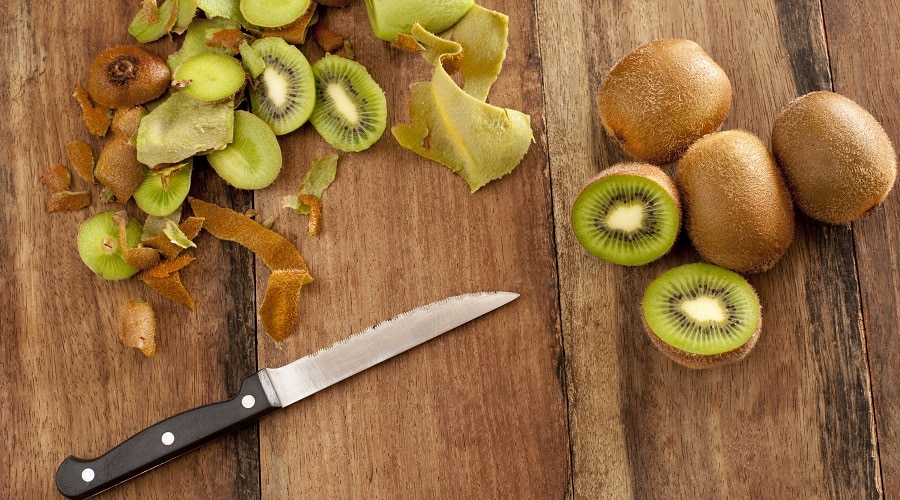
Kiwi fruit is safe for pups if the skin and seeds are removed. As with most other fruits, add a small amount of benefit. They should not be fed to canines regularly. Kiwi does have dietary fiber, vitamins and minerals, and antioxidants. These are all beneficial. However, a dog must eat huge amounts for significant health benefits.
Remember that these can be a choking hazard if eaten whole, and the skin can cause constipation.
Benefits:
- Fiber can regulate the digestive system
- Antioxidants include beta-carotene, folate, and lutein
- Vitamins and minerals that support the skin and circulatory systems
13. Mango
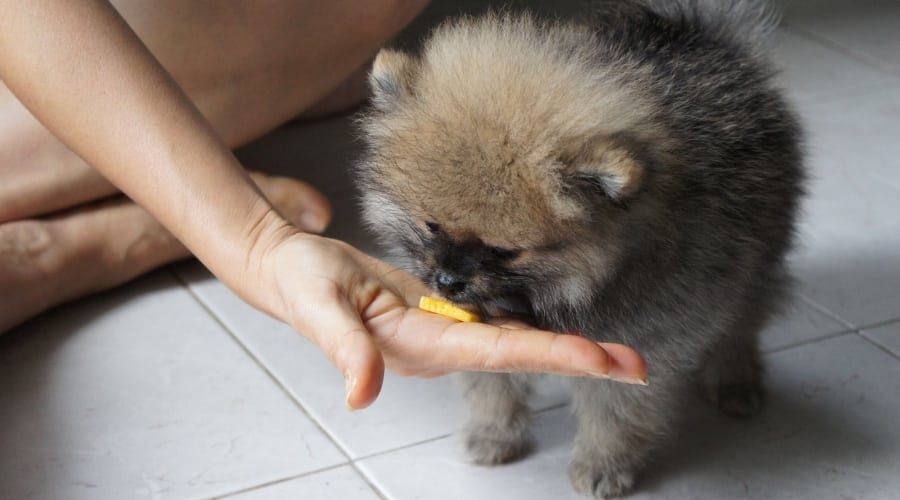
Mangos are a great source of Vitamins A and C and fiber. They also contain antioxidants that help promote a healthy immune system and reduce inflammation. Keep in mind that mangos have higher sugar and calories, and too much can cause digestive problems. They should not be eaten in large amounts, as they can cause stomach distress due to triglycerides.
The skin is too tough to digest, and the pit is a choking hazard. Make sure to remove both before feeding your pet. Mangos are a great way to add moisture to your dog’s diet as an occasional treat. They can be served fresh or frozen.
Benefits:
- Fat-free
- Dogs like the taste
- Low calorie
- High in Vitamin A, B6, C, and E
14. Nectarines
Nectarines are okay as long as the pits are entirely removed. Pits contain cyanide and are a choking and internal obstruction hazard. Never give a dog the pits. Nectarines have several beneficial qualities. They are packed with moisture, dietary fibers, phytonutrients, antioxidants, vitamins, and minerals.
Only serve fresh fruit, and never more than a few slices.
Benefits:
- High in Vitamin C
- Low calorie
- Boost hydration
15. Oranges

They help reduce inflammation, promote a healthy immune system, and improve digestion. Like any fruit, too much orange can cause digestive problems, and the acidity can irritate your pet’s stomach.
Oranges (and clementines) are excellent sources of vitamin C, potassium, and fiber, which can help your pup’s immune system. However, vets recommend giving your dog only a slice or two with the peel and seeds removed. These citrus fruits have moderate sugar levels, but too many slices can upset your dog’s tummy due to the high citric acid.
Always remove the peel and seeds, and only feed in small amounts. Be careful with acidic fruits, as they sometimes cause diarrhea and vomiting. Discuss with your vet before adding oranges to your pet’s diet. Stick with fresh, peeled fruit, and avoid the juice.
Benefits:
- Loaded with fibers
- High in potassium
- Reduce inflammation
- Boosts immune system
16. Papaya

The papaya fruit contains minerals and vitamins that promote full-body health. Nutrients, including potassium, calcium, and folate, support bones and blood. Fiber is helpful in digestion and in avoiding constipation. Vitamins A, C, E, and K support the immune system, skin, and coat. Papayas are lower in sugar than some fruits and contain digestive enzymes to help break down other foods.
Try to remove the seeds as they contain cyanide. The skin is tough and should also be removed.
Benefits:
- Boost the immune system and heart health
- Vitamins A and C, and antioxidants
- Low in sugar and calories
- It boosts digestion and prevents constipation
17. Peaches
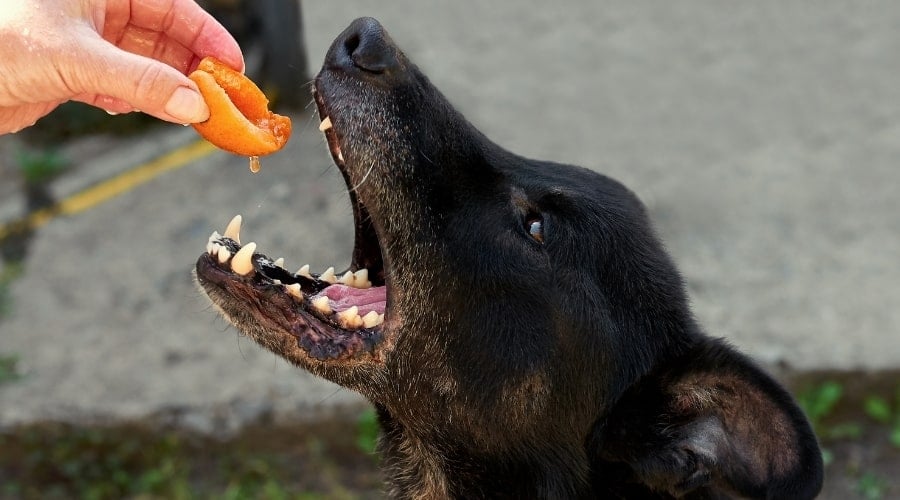
Peach flesh is safe, but like other stone fruits, the pits must be removed. Peaches are also good sources of vitamins, minerals, antioxidants, and fiber.
Always wash before serving and remove pits. Some pups may not like the skin. Fresh or frozen fruit is safe. Stay away from canned fruits soaked in heavy syrup.
Benefits:
- Fights infections
- High in fiber
- Low calorie
18. Pears
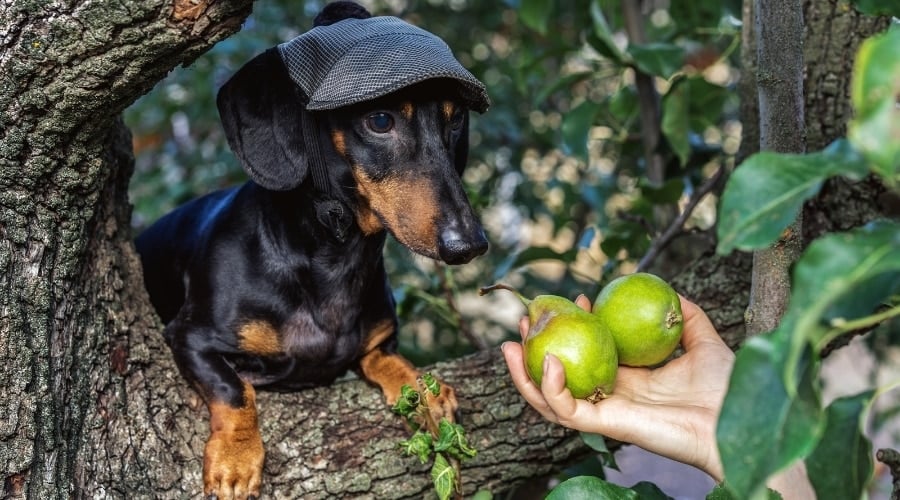
Pears are a very healthy treat for canines. When fed correctly, pear is an appropriate and healthy option to treat your dog. They are a healthy source of fiber, copper, and Vitamins A, C, and K. They contain probiotics, potassium, calcium, and magnesium.
Always feed fresh fruit and remove seeds, skin, leaves, and stems. Only feed these very occasionally, as too much can cause stomach distress.
Benefits:
- Supports muscle and nerve function
- Dietary fiber for digestion
- Boosts immune system health
19. Pineapple

Pineapple is safe, but only in small amounts. Fresh fruit is best. Pineapple is full of Vitamin C and minerals like iron, potassium, magnesium, copper, phosphorus, calcium, and zinc. The juicy fruit is nutrient-dense but also very sweet. Notably, it contains bromelain, a natural histamine that is anti-inflammatory.
Remove all peels and extra fibrous core. Feed small bites by hand. They can be fresh or frozen. Pureed pineapple can also be added to your pup’s diet for extra moisture, though not every day.
Benefits:
- Nutrient-dense properties
- It can support digestion
- Antimicrobial effects on the skin
20. Pumpkin
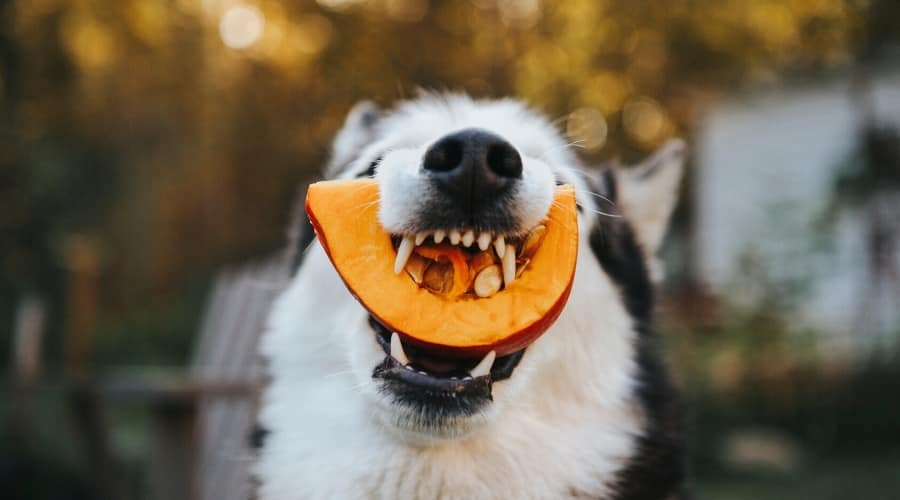
Pumpkin is a common ingredient in many high-quality dog foods. Like butternut squash, it is not often thought of as a fruit, but it is. Raw pumpkins should be avoided, but cooked fruit without the skin is safe. Stay away from any added ingredients or seasoning. Plain, cooked pumpkin is best. Pumpkin flesh is a good source of fiber. It also contains Vitamins A, C, E, and B6, lycopene, niacin, thiamine, folate, calcium, and potassium. Pumpkin seeds are not dangerous to feed to canines if cleaned and roasted with no salt or flavorings.
Mashed or pureed pumpkin is an excellent way to help pups with diarrhea and reduce anal gland problems. Pumpkin can also help with constipation and hairball control. Dogs can safely add a small amount of pumpkin to their diet daily. It is also beneficial for weight loss as it helps pets feel full for longer.
Benefits:
- Helps with digestion
- Diarrhea aid
- Bellies feel full longer
- Daily use
- Low in sugar and high in nutrients
Our Personal Experience Feeding Dogs Pumpkin
“My dog has had an occasional upset tummy, and my go-to cure is adding pumpkin to her diet for a couple of days. It always settles her stomach, plus she loves the taste of it. It’s a win-win!”
– Kimberly Alt, Treeing Walker Coonhound Parent, Canine Journal Writer & Pet Insurance Expert
21. Raspberry
Raspberries are safe for canines and can be a tasty snack. They are safe to be fed as they are. Simply wash them to ensure no chemicals or bugs are on them. These juicy berries contain Vitamins A, B, C, and E and are high in minerals. They also have beneficial antioxidants, believed to help with inflammation, allergies, and arthritis, and even help fight cancer.
These berries are a good choice because they are very low in sugar and calories. Raspberries contain high levels of dietary fiber, Vitamin C, manganese, and other nutrients. They also contain trace amounts of minerals like manganese, potassium, iron, and copper that support the skeletal system, cell function, muscles, and nervous system.
Benefits:
- It can help with both diarrhea and constipation
- Fiber helps canines lose weight
- Low in sugar
- B-complex Vitamins for coat health
22. Strawberry

Strawberries are a great source of fiber, Vitamin C, and antioxidants. They help reduce inflammation, promote a healthy body system, and improve cognitive function. Strawberries are high in vitamins, including B1, B6, and Vitamin K. Additionally, strawberries are low in calories and sugar, making them an excellent option for pups struggling with weight management.
Fresh or frozen berries are safe as long as the leaves and stalks are removed. Avoid strawberry syrup, jelly, and jam, as these often use lots of added sugar, artificial sweeteners, and other ingredients.
Benefits:
- Omega 3 fatty acids support skin and cold health
- Aids indigestion
- Boosts immune system
- Fresh fruit works to slow down the aging process
- Strawberries help whiten teeth
23. Watermelon
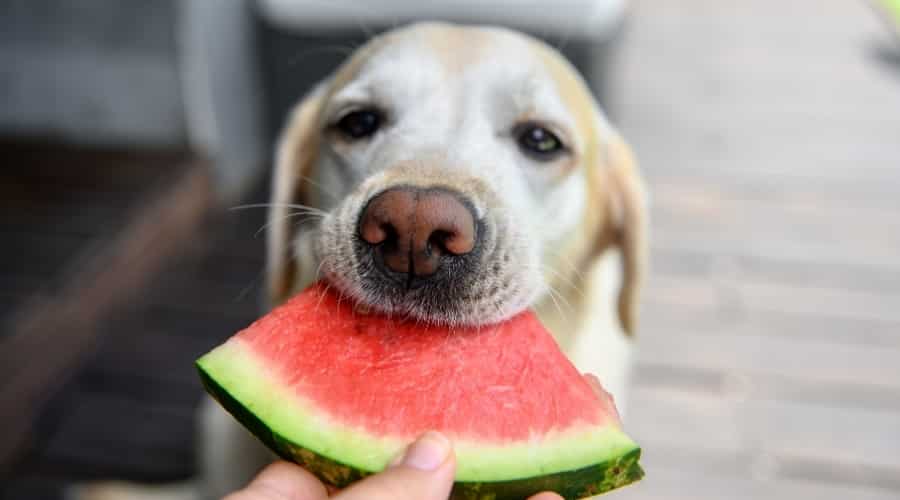
Watermelon is safe for dogs if the seeds and rinds are removed. Many pups love this moisture-rich, sweet melon. Watermelon is extremely low in calories and very high in moisture, 92% water, so it adds plenty of moisture to your pup’s diet without a lot of sugar. Watermelon is full of nutrients, including potassium and Vitamins A, B6, and C.
Juicy watermelon can be fed to pets fresh or frozen, as well as in a puree. Some pups even like it blended in with unsweetened yogurt.
Benefits:
- High in moisture
- Antioxidants boost overall health and function
- High in potassium, vitamins A, B-6, and C
- Good fruit choice for overweight dogs (contains the amino acid arginine, which helps burn fat)
- Low in calories and carbohydrates
Our Personal Experience Feeding Dogs Watermelon
“My dog loves watermelon, and the kids love sharing it with her. I suggest feeding it to your dog outside as the juiciness of the fruit can drip from your dog’s mouth and make your floors sticky.”
– Kimberly Alt, Treeing Walker Coonhound Parent, Canine Journal Writer & Pet Insurance Expert
4 Fruits Dogs Shouldn’t Eat

So, what fruits are bad for dogs? Only a handful, fortunately. But it’s extremely important to avoid some of these at all costs.
1. Avocado
A super healthy and human favorite fruit, avocado isn’t usually recommended for pups. The leaves, skin, pit, and fleshy inside of avocados contain persin, a dangerous toxin for many mammals. Veterinary experts say that canines are more resistant to this toxin than other animals, but it can still cause vomiting and diarrhea in dogs.
Persin levels aren’t as high in the flesh of avocadoes, so a very small amount may be okay to give your pup on rare occasions. But this flesh is also high in fat, which can lead to an upset stomach, pancreatitis, and weight gain if they eat too much. And keep in mind that the pit poses a choking hazard.
2. Cherries
While cherries are nutritious (and delicious cocktail toppers) for humans, they’re off-limits for our canine counterparts. The stem, leaves, and pit can contain cyanide, which is toxic to dogs. The pit can also pose a choking hazard or cause an intestinal blockage. Also, while the flesh around the pit isn’t toxic to dogs, it typically causes an upset stomach. Signs of cyanide poisoning include difficulty breathing, red gums, and dilated pupils.
3. Lemons & Limes
Although it helps that dogs typically dislike the scent of these citrusy fruits, they’re not safe for our furry friends. First, they contain a lot of citric acid, which can cause digestive problems. But more concerning is that the skin and rind of lemons and limes contain psoralen, which is toxic to dogs. Swallowing the rinds can also result in gastric obstruction.
4. Grapes & Raisins
Grapes and raisins (dried grapes) top the list of fruits to NEVER give your pup. They’re extremely toxic to dogs and can even cause acute (sudden) kidney failure. Vomiting is an early sign, followed by depression and low energy. While this doesn’t occur with every dog who eats a grape or raisin, you certainly don’t want to take the chance.
Learn more about what foods are unsafe for dogs in our guide on safe and toxic foods. If you have any questions or experience with dogs eating a specific fruit, I’d love to hear about it in the comments.
What To Do If Your Dog Eats Grapes
Learn more about what to do if your dog eats grapes in our vet-written guide.
Are Commercial Dried Fruits Okay For Dogs?
Dehydrated or freeze-dried fruit can be a terrific alternative to traditional dog treats as long as you check the package’s ingredients. Many contain added sugars, preservatives, and other ingredients that aren’t healthy for dogs. And make sure you never give your pup anything containing the sugar substitute xylitol because it’s extremely toxic to dogs.
I recommend Nature’s Turn Freeze-Dried Fruit Snacks, which contain 100% non-GMO fruit. While they’re convenient for avoiding food prep time, keep in mind that these snacks remove the bulk of water from the fruit, so fresh fruit is the better option for your pup.
Keeping Your Pup’s Diet Healthy
A healthy diet is a cornerstone of your pup’s lifelong health. Starting from the very first day they come home, try to provide them with the best quality food you can. Luckily, there is no shortage of quality dog food options to choose from. If you love the idea of human-grade and fresh food, plenty of options exist. We cover several in detail in our best fresh dog food delivery reviews. If your pup has a sensitive stomach or any medical needs, discuss any major dietary changes with your veterinarian first.
Why Trust Canine Journal?
Danielle has had a unique bond with dogs since she was a child and has over 30 years of pet care experience and advocacy. She is a professional researcher and spends countless hours researching the latest science and data-backed research on pet care, health, nutrition, and training developments. With the enthusiastic help of her rescue pups, Daisy and Falkor, she has tested and researched over 100 dog food brands and counting. She works with a professional and experienced team to bring our readers the best, most accurate, and up-to-date information.
